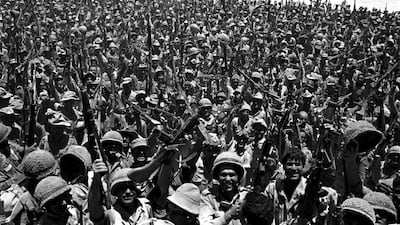This week marks the 50th anniversary of the 1967 Arab-Israeli conflict when Israeli forces overran the Sinai Peninsula, the Gaza Strip, the West Bank and much of the Golan Heights, beating the Egyptian, Jordanian and Syrian armed forces.
For most of the ensuing decades, my life has been intimately entwined with the Arab world, in particular with the UAE, where I first arrived over 40 years ago, but it was the 1967 war that led me to begin my engagement with the region.
I was then a student in the School of African and Asian Studies at Britain's University of Sussex and an activist in the left-wing Young Liberals, and I remember well the activity on campus as we tried to follow the progress of the conflict.
From the coverage of events provided by institutions such as the BBC, we rapidly realised that the Israelis were inflicting a devastating defeat on their Arab neighbours. In contrast, radio stations such as Cairo's Sawt Al Arab (Voice of the Arabs) told lies, hiding the scale of that unfolding defeat from their audiences.
At the time – in Western Europe, anyway – Israel was seen as a little state whose existence was threatened by Arab “hordes”. Little was known of the events that accompanied the birth of Israel, less than 20 years earlier, with the Nakba (Catastrophe) of the expulsion or flight of 700,000 Palestinian refugees, while Israel had, of course, been an ally of Britain in the 1956 Suez conflict. Israel was seen by many as a model society, however inaccurate that might have been, while the memories of the Holocaust inflicted on Europe’s Jewry by the Nazis during the Second World War were still fresh in people’s minds.
It was not surprising that the outbreak of the 1967 war stimulated a wave of sympathy for Israel on campus. A number of students and lecturers rapidly set in motion a fund-raising campaign to “Buy a Tank for Israel”.
A fellow student and I took a different view, based upon our studies of the history of the British Empire and the process of decolonisation. Perhaps that and our engagement in activities opposed to the apartheid regime in South Africa, along with a number of South African exiles at the university, affected our views of the unfolding Middle East conflict.
So we launched a “Buy a Tank for Egypt” campaign, arguing, somewhat tongue-in-cheek, that Egypt clearly had a greater need for more tanks than the victorious Israelis.
We were not very successful in raising funds and the war ended very quickly anyway. We were stunned, however, by the hostility we faced. One lecturer was apoplectic, accusing us of anti-Semitism and of advocating the driving of the Israelis into the sea. Only later did we discover that he was a British-born Israeli and that he had formerly served in Israel's army as well as in the prime minister’s office.
In the years that followed, I became accustomed to such unfounded accusations and my support for the Palestinians deepened. Israel’s governments steadily moved to the right, creating and expanding settlements in the occupied territories, blocking any efforts to reach a just settlement. Israel is no longer a weakling – if it ever was.
Over the years, too, the failures of the Palestinian leadership and the pitiful performance of the Palestinian Authority have contributed to a situation where a rolling back of the results of the 1967 war seems inconceivable. Today, with much of the Arab world in disarray and with rising international concern about fundamentalist terrorism and Iranian aspirations in the Middle East, there is little prospect of an acceptable deal between Israel and the Palestinians. The long-sought ideal of a two-state solution is increasingly a chimera, an impossible dream.
My youthful enthusiasm in June 1967 has long since faded, being replaced with a sad recognition that injustices are not, inevitably, bound to come to an end.
Peter Hellyer is a consultant specialising in the UAE’s history and culture


